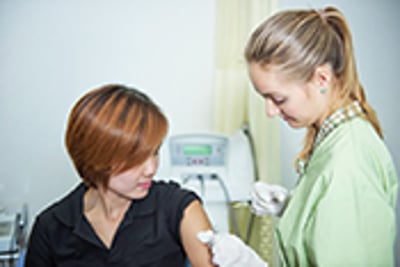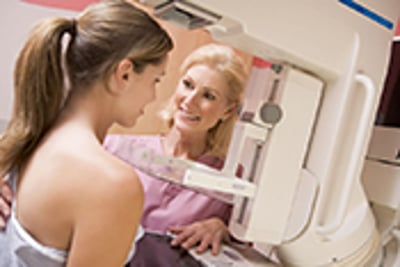FORCE's eXamining the Relevance of Articles for You (XRAY) program looks behind the headlines of cancer news to help you understand what the research means for you.
XRAY is a reliable source of hereditary cancer research-related news and information.
Learn more about the XRAY program
Categories Cancer Risk
Relevance: Medium


Strength of Science: Medium


Study : Breast cancer rates are rapidly increasing among Asian women in California
Relevance: Medium


Strength of Science: Medium


Most relevant for: Asian American women
The majority of racial groups in the United States have seen declines in breast cancer rates. However, this study provides new insights into the patterns of breast cancer rates in Asian American subgroups in California. Using 26 years of data, this research found that breast cancer is rapidly increasing among this population, contrasting to a decline in rates among non-Hispanic white women in California and nationwide. (8/15/17)
Read More
Relevance: Medium-Low


Strength of Science: Medium-Low


Research Timeline: Animal Studies


Article : Report on vaccines to prevent hereditary cancer
Relevance: Medium-Low


Strength of Science: Medium-Low


Research Timeline: Animal Studies


Most relevant for: High risk women who have not had breast cancer
On 05/30/2017, Good Morning America aired a segment entitled “Can a vaccine help prevent breast cancer at its earliest stages?” The story outlines the need for cancer prevention and hints at early research into a cancer vaccine. (8/1/17)
Read More
Relevance: High


Strength of Science: High


Research Timeline: Post Approval


Study : New cancer risk estimates for BRCA1/2 mutation carriers
Relevance: High


Strength of Science: High


Research Timeline: Post Approval


Most relevant for: Women with an inherited mutation in BRCA1 or BRCA2
Cancer risk estimates for BRCA1 and BRCA2 mutation carriers are important because they impact patient decision-making. Until now, almost all risk estimates for mutation carriers were based on results of retrospective studies that looked back on mutation carriers who had cancer. This new study is prospective—it followed almost 10,000 BRCA mutation carriers without cancer to see if or when they developed breast or ovarian cancer. The cancer risk estimates of this study may be more accurate because it followed mutation carriers who did not have cancer over time. (7/28/17)
Read More
Study : Gaps in genetic testing and decision-making for women with early-stage breast cancer
Most relevant for: People diagnosed with early stage breast cancer
Genetic testing for cancer risk is now more affordable and easier to obtain. As a result, many breast cancer patients are tested without ever seeing a genetic counselor. Genetic testing results affect treatment decision making, but they can be confusing, especially if patients do not receive genetic counseling. This study looks at breast cancer patients’ experiences following genetic testing and how testing results affect surgical decision making. (7/14/17)
Read More
Study : Diet during teen years and early adulthood is linked to breast cancer risk
Most relevant for: Adolescent and young adult women
During teen years, breast tissue grows rapidly in young girls and is more likely to be harmed by substances that are known to cause cancer. Few studies have looked at the relationship between diet during puberty and breast cancer risk. This study looks at how a woman’s diet during their teenage years and early adulthood is associated with breast cancer development later in life. (6/30/17)
Read More
Study : FDA report claims women with breast implants may be at risk for rare cancer
Most relevant for: Women who had or are consideration breast reconstruction with implants
THIS INFORMATION HAS BEEN UPDATED. The FDA issued an update in March, 2018 about Breast Implant Associated Anaplastic Large Cell Lymphoma (BIA-ALCL). This was covered in a more recent XRAY review. On 07/25/19, the FDA announced a recall of Allergan BIOCELL textured implants and expanders, due to their association with BIA-ALCL. This was also covered in a more recent XRAY review.
Recent headlines highlighted an FDA report stating that patients with breast implants may be at increased risk for a rare type of non-Hodgkin lymphoma. What is the scientific evidence behind this claim? (4/21/17)
Read More
Relevance: Medium-High


Strength of Science: Medium-Low


Study : Routine breast cancer screening leads to overdiagnosis
Relevance: Medium-High


Strength of Science: Medium-Low


Most relevant for: Women at average risk for breast cancer
Routine breast cancer screening for women of average risk has been controversial for many years because some believe that the benefits do not outweigh the risks. Recent headlines covering a study in Denmark suggests that routine breast cancer screening leads to “overdiagnosis” of breast cancer. (4/4/17)
Read More
Relevance: Medium-High


Strength of Science: Medium


Research Timeline: Human Research


Study : Does working night shifts increase breast cancer risk?
Relevance: Medium-High


Strength of Science: Medium


Research Timeline: Human Research


Most relevant for: Women who work night shifts or have in the past
The World Health Organization’s International Agency for Research on Cancer (IARC) classified night shift work as a possible risk factor for breast cancer in 2007, although the majority of the evidence for this claim came from studies of animals after their normal sleep-wake cycle was disrupted. The authors of this study surveyed women from three different cohorts to examine whether night shift work can increase a woman’s breast cancer risk. (3/24/17)
Read More
Relevance: High


Strength of Science: Medium-High


Research Timeline: Post Approval


Study : Patient experiences with genetic testing
Relevance: High


Strength of Science: Medium-High


Research Timeline: Post Approval


Most relevant for: Women diagnosed with early-stage breast cancer
Patients can now find out if they have a mutation in more than 20 different genes that are associated with cancer risk, thanks to research advances and the decreasing cost of genetic testing. However, patients’ experiences and use of genetic counseling and testing with these changes are unknown. Do patients want genetic testing? Are they getting tested? (3/7/17)
Read More
Relevance: Medium-High


Strength of Science: Medium-High


Research Timeline: Post Approval


Study : A step in the development of a new breast cancer risk assessment tool for Hispanic women
Relevance: Medium-High


Strength of Science: Medium-High


Research Timeline: Post Approval


Most relevant for: Hispanic women
Current tools used to calculate breast cancer risk make their estimations based on data from non-Hispanic white women and may not accurately predict breast cancer risk in women of other races and ethnicities. With further testing, a new risk assessment tool developed specifically for Hispanic women could more accurately predict breast cancer risk in women who do not have mutations in BRCA or other genes associated with hereditary breast cancer. (02/07/17)
Read More